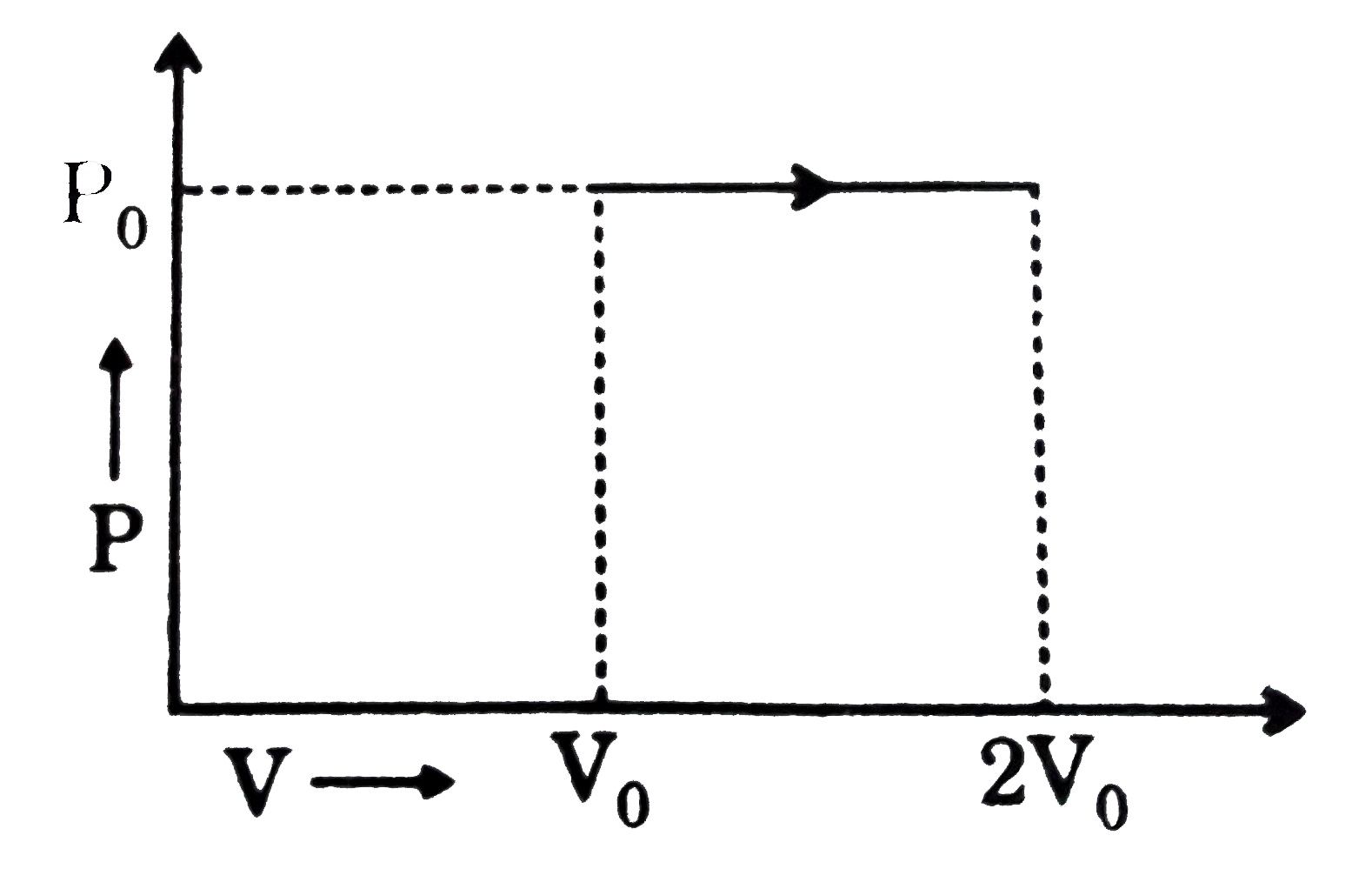Certain amount of an ideal gas (γ=1.4) performs 80J of work while undergoing isobaric expansion. Find the amount of heat absorbed by the gas in the process and the change in its internal energy.Solution in Bengali
For n mol of a gas,
pV=nRTor,pdV=nRdT[∴ p constant]
or, dW=nRdTor,dT=dWnR ….(1)
Also, CpCv=γor,Cp−CvCv=γ−11
or, Cv=nRγ−1[∴Cp−Cv=nR] ….(2)
We know, change in internal energy,
dU=CvRT ....(3)
From (1), (2) and (3)
dU=nRγ−1×dWnR=801−1.4=200J.
Topper's Solved these Questions
- FIRST AND SECOND LAW OF THERMODYNAMICSBOOK - CHHAYA PUBLICATIONCHAPTER - FIRST AND SECOND LAW OF THERMODYNAMICSEXERCISE - Examination Archive with solution (WBJEE)
8 Videos
- FIRST AND SECOND LAW OF THERMODYNAMICSBOOK - CHHAYA PUBLICATIONCHAPTER - FIRST AND SECOND LAW OF THERMODYNAMICSEXERCISE - Examination Archive with solution (JEE Main)
6 Videos
- FIRST AND SECOND LAW OF THERMODYNAMICSBOOK - CHHAYA PUBLICATIONCHAPTER - FIRST AND SECOND LAW OF THERMODYNAMICSEXERCISE - Entrance Corner - Integer answer type
5 Videos
- EXPANSION OF SOLIDS AND LIQUIDSBOOK - CHHAYA PUBLICATIONCHAPTER - EXPANSION OF SOLIDS AND LIQUIDSEXERCISE - CBSE SCANNER
2 Videos
- FRICTION BOOK - CHHAYA PUBLICATIONCHAPTER - FRICTION EXERCISE - CBSE SCANNER
7 Videos
Similar Questions
One mole of an ideal monatomic gas is heated at a constant pressure from 0∘C to 100∘C. Then the change in the internal energy of the gas is (given R=8.32J⋅mol⋅k−1)
View SolutionOne mole of diatomic ideal gas undergoes a cyclic process ABC as shown in fig. The process BC is adiabatic. The temperature at A, B and C are 400 K, 800 K and 600 K, respectively. Choose the correct statement.

View SolutionA diatomic ideal gas is compressed adiabatically to 132 of its initial volume. If the initial temperature of the gas is T1 (in kelvin) and the final temperature is aT1.Find the value of a.
View SolutionShow that the coefficient of superficial expansion of a rectangular sheet of the solid is twice its coefficient of linear expansion.
View SolutionDefine angle of friction. The inclination θ of a rough plane is increased gradually. The ply on the plane just comes into motion when inclination θ becomes 30∘. Find coefficient of friction. If the inclination is further increased to 45∘ then find acceleration of the body along the plane. (g = 10 m.s−2)
View SolutionA sample of ideal gas (γ=1.4) is heated at constant pressure. If 140J of heat is supplied to gas, find ΔU and W.
View SolutionA diatomic gas (γ=1.4) does 200 J of work when it is expanded isobarically. Find the heat given to the gas in the process.
View SolutionAn amount of heat is added to a monatomic ideal gas in a process in which the gas performs work Q2 on its surrounding. Find the molar heat capacity for the process.
View SolutionAs a result of the isobaric heating by DeltaT=72K , one mole of a certain ideal gas obtain an amount of heat Q=1.6kJ . Find the work performed by the gas, the increment of its internal energy and gamma .
View SolutionAn ideal gas with the adiabatic exponent gamma undergoes a process in which its internal energy relates to the volume as u = aV^alpha . Where a and alpha are constants. Find : (a) the work performed by the gas and the amount of heat to be transferred to this gas to increase its internal energy by Delta U , (b) the molar heat capacity of the gas in this process.
View SolutionIf the internal energy of an ideal gas varies as U=2PV and the gas undergoes an expansion as shown below, then heat absorbed in the process will be :

View SolutionAs a result of heating a mole of an ideal gas at constant pressure by 72^(@)C , a heat flow by an amount 1600 joules takes place. Find the work performed by the gas, ther increment of its internal energy, and the value of gamma .
View SolutionAn ideal gas with the adiabatic exponent gamma undergoes a process in which its internal energy relates to the volume as U=aV^alpha , where a and alpha are constants. Find the work performed by the gas and the amount of heat to be transferred to this gas to increase its internal energy by DeltaU
View SolutionA sample of an ideal gas undergoes on isothermal expansion. If dQ, dU and dW represent the amount of heat supplied, the change in internal energy and the work done respectively,then
View SolutionAn amount of heat is added to a monatomic ideal gas in a process in which the gas performs work Q/2 on its surrounding. Find the molar heat capacity for the process.
View Solution
